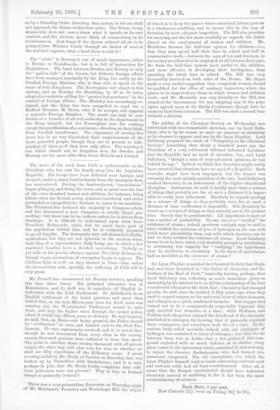Sir Lyon Playfair reminded the Chemical Society that Boyle had
once been described as "the father of chemistry, and the brother of the Earl of Cork," ironically hinting, perhaps, that Lord Salisbury was reflecting as much immediate glory on chemistry by his interest in it., as did the relationship of the first considerable chemist to the Irish Earl. Chemistry had changed greatly, he said, since he studied it fifty years ago, when they used to regard oxygen as the universal lover of other elements, and nitrogen as a quiet, confirmed bachelor. But oxygen had turned out to be a comparatively respectable bigamist that only married two elements at a time ; while Hoffman and Perkins had altogether exposed the falsehood of the character attributed to nitrogen, by showing that it generally required three conjugates, and sometimes took five at a time. In the curious body called azoimide, indeed, only one conjugate of hydrogen was contained to three of nitrogen; but then the tie between them was so feeble, that a few grains of this com- pound exploded with so much violence as to shatter every glass vessel in the laboratory which contained it, and seriously to injure the chemist, Radenhausen, who had formed this unnatural compound. The old conceptions, too, which Sir Lyon Playfair himself used to teach concerning carbonic acid and carbonic oxide had all been revolutionised. After all, it seems that the French revolutionist should have welcomed chemistry instead of snubbing it, for it has been the most revolutionising of sciences.






































 Previous page
Previous page